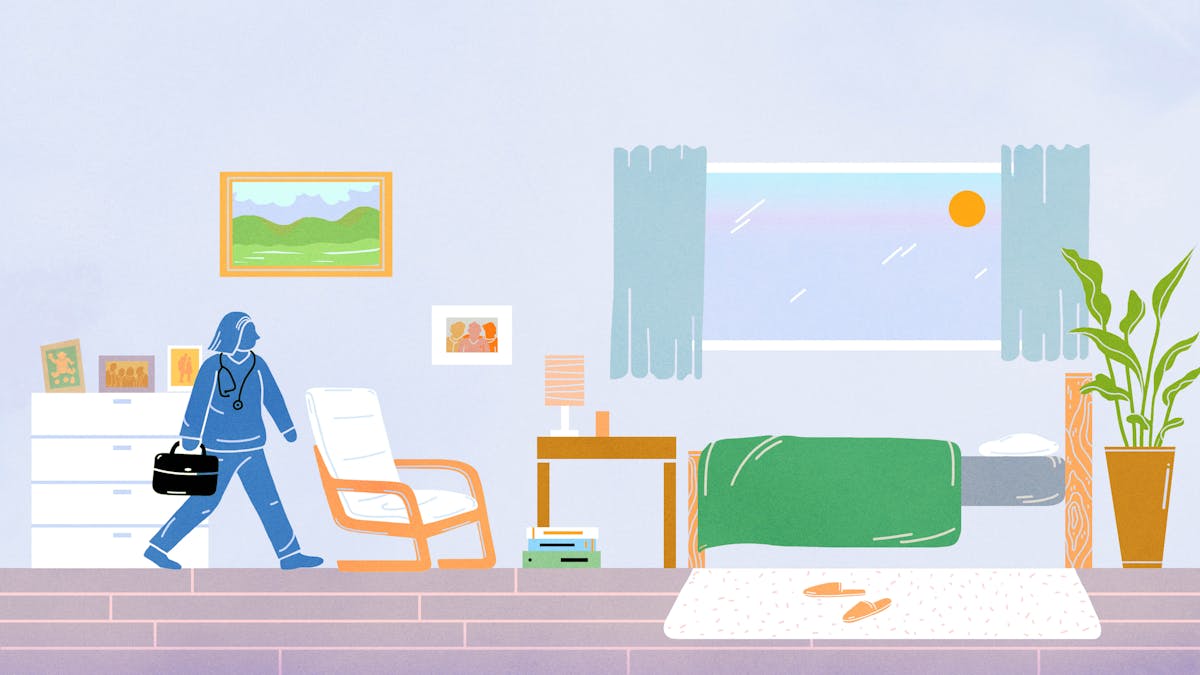Supporting patients who want to die at home is a difficult but rewarding part of a GP’s job. Our anonymous doctor talks about providing physical and emotional comfort for a man nearing the end of his life.
Dying at home and the doctor’s role
Words by The Secret GPaverage reading time 4 minutes
- Article

When I was at medical school, we did an exercise that involved imagining our ideal place to die. (Try it if you want a fun few minutes!) We nearly all imagined our bed at home. We all hope that when we – and our loved ones – die, our death will be peaceful, painless and usually at home.
Recently I was called to see a frail elderly gentleman whom I had never met before. As soon as I met him, I knew he was really unwell. He was blue and breathless. But he was able to smile and he didn’t look uncomfortable. I thought he had pneumonia and would need oxygen and antibiotics in hospital in order to survive.
I was frank with him and he immediately said he did not want to go to hospital. He wanted to stay at home whatever the circumstances. This may sound straightforward, but when your brain is starved of oxygen you struggle to make good decisions. As his doctor, I needed to make sure that he truly understood the full implications of not going to hospital for treatment.
His carer backed him up, telling me, “He desperately doesn’t want to go hospital.” This gentleman had usefully given his daughter power of attorney for health and welfare and I was able to contact her. She backed him up too. He had made it expressly clear that he did not want to go to hospital, whatever the situation, even if that meant he was very likely to die from this illness.
Palliative care at home
I kept him comfortable at home in accordance with his wishes. He needed more nursing, so I informed the district nurses and the care agency, which then stepped up care appropriately. He died two days later, peacefully and at home.
To be honest, even if he had gone to hospital, given his age and frailty he had a high likelihood of dying there. And he would have been in a busy hospital ward with lots of equipment, and staff and surroundings that he wasn’t familiar with.
I am sure that it was the right thing to keep him at home. But it is a hard decision to make when there is a risk to life, and a chance of survival, however small, with hospital care. It feels right to give oxygen to someone who needs it and to try to prolong their life.
MORE: Living with early onset Parkinson's
In a hospital setting there is a big team of doctors and nurses around to consult, so the decision that medical treatment is fruitless is made as a team. In the community, it’s just me making that call. Advance directives and giving someone power of attorney really help in this situation – so if you have unwell or elderly relatives, please find out about these so health professionals know what your wishes are.
When GPs have identified that someone is likely to die soon, and they aren’t going to hospital, there are a few medications we provide in case death is uncomfortable. These are controlled drugs such as morphine and midazolam, which can be used for pain, anxiety and breathlessness. We use other drugs to control common symptoms such as secretions and nausea.
Some people will never need these drugs, but they are provided at home, ready to use at the end of life, just in case. The key is to be prepared for all eventualities.
Sometimes the situation will call for the palliative care team. This team of specialist nurses and doctors are expert in symptom control and are some of the bravest, kindest health professionals you will ever meet. They can make a huge difference in providing a peaceful, comfortable death.
Challenges and rewards
Care of the dying is challenging because it is emotional and draining. One minute you’re visiting a dying patient and having tough discussions about imminent death. The next minute you’re back in the clinic seeing patients for routine consultations. There is no time to think in between. Most doctors cope by compartmentalising these difficult situations.
Supporting a dying person might be time-consuming and unpredictable, but it’s the one time I really don’t mind staying late. After a death, families are usually very grateful for the care and time I spent with them and their loved one; this makes the whole job incredibly worthwhile.
I spoke to the elderly man’s daughter after he died. She was relieved we hadn’t performed heroics, involving ambulances and hospitals, and that we had been able to keep him at home, comfortable in his own bed.
About the author
The Secret GP
Our anonymous doctor shares what it’s really like behind the scenes in the surgery.
